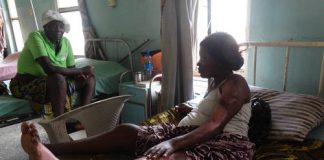The bane of development in Africa – ignorance and corruption – can be seen in various facets of life in the continent. A new study shows that more children infected with HIV in sub-Saharan Africa are dying early in hospitals in spite of the availability of Anti-Retroviral Therapy, ART, blaming the situation on delayed diagnosis among patients.
What the study also shows is that ART has not helped increase chances of survival for hospitalized children. The details have been published in the Lancet Health Journal based in Pretoria, South Africa.
The scientists observed that HIV infection in most children is discovered when they are admitted to hospitals, an indication that there is hardly an attempt to make routine checks for the status of the children. The study stated, “Many HIV-infected children in sub-Saharan Africa are frequently diagnosed during hospitalization for an acute co-infection and experience high early mortality”.
It also stated that anti-retroviral therapy among hospitalized HIV-infected children might not speed up recovery and may in fact inhibit immune regeneration.
The research was conducted on 191 out of the 250 hospitalized HIV-infected children in six hospitals aged between 0-12 years. Most of the deaths of the children occurred in the first month and dropped strikingly between one month and three months.
No deaths occurred between three months and six months after ART initiation. Results show that speeding up anti-retroviral therapy during hospitalization does not have any survival benefit.
The research revealed that, “Though rapid HIV diagnosis within one day of enrolment was practised at the four hospital sites, ART initiated within 48 hours did not reduce mortality when compared with ART initiated between 7 days and 14 days”.
A previous study in Kenya showed that 41 percent of hospitalised infants died before ART initiation at the average of 11 days after diagnosis, suggesting a narrow window for intervention in children. “Together, the studies suggest that waiting for more than 21 days might be too late while expediting to less than seven days might not provide survival benefit,” said the study.
The research also found out that delays by caregivers in providing ART treatment to the children were common and may have increased the risk of death.

















